Ford Puma VS Subaru Outback – Specs, Efficiency & Price Comparison
Which model is the better choice – the Ford Puma or the Subaru Outback? We compare performance (168 HP vs 169 HP), boot capacity (523 L vs 561 L), efficiency (13.10 kWh5.40 L vs 8.60 L), and of course, the price (24800 £ vs 37200 £).
Find out now which car fits your needs better!
The Ford Puma (SUV) is powered by a Petrol MHEV or Electric engine and comes with a Manuel or Automatic transmission. In comparison, the Subaru Outback (Estate) features a Petrol engine and a Automatic gearbox.
When it comes to boot capacity, the Ford Puma offers 523 L, while the Subaru Outback provides 561 L – depending on what matters most to you. If you’re looking for more power, you’ll need to decide whether the 168 HP of the Ford Puma or the 169 HP of the Subaru Outback suits your needs better.
There are also differences in efficiency: 13.10 kWh5.40 L vs 8.60 L. In terms of price, the Ford Puma starts at 24800 £, while the Subaru Outback is available from 37200 £.
Compare all the key specs now and find out which model fits your lifestyle best!
Ford Puma
The Ford Puma presents itself as a stylish compact SUV with a distinctive design that combines practicality with a dynamic driving experience. Its sleek lines and sporty aesthetics make it stand out on the road, while the interior offers a comfortable and tech-savvy environment. With an emphasis on efficiency and a smooth drive, the Ford Puma is well-suited for both urban commutes and countryside adventures.
details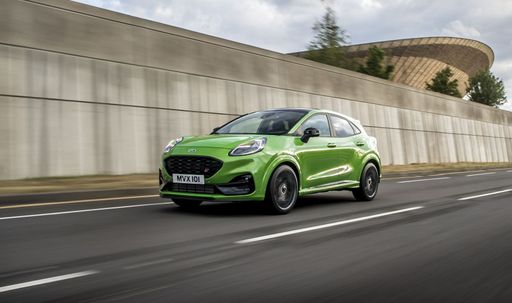 @ puma.fordpresskits.com
@ puma.fordpresskits.com
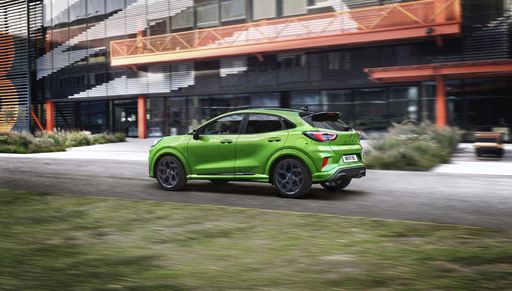 @ puma.fordpresskits.com
@ puma.fordpresskits.com
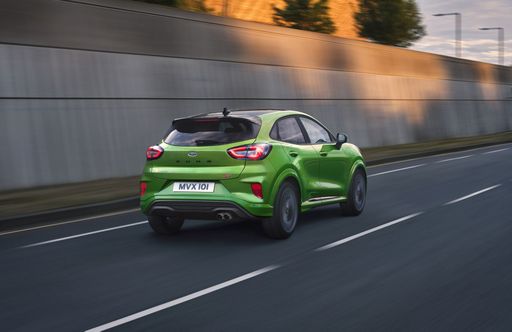 @ puma.fordpresskits.com
@ puma.fordpresskits.com
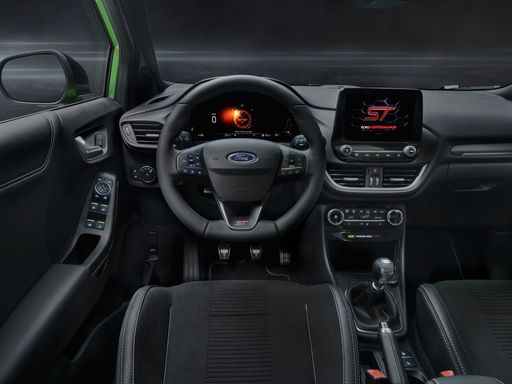 @ puma.fordpresskits.com
@ puma.fordpresskits.com
Subaru Outback
The Subaru Outback offers a perfect blend of rugged capability and modern comfort, making it an ideal choice for those who love adventure without compromising on convenience. Its robust design is complemented by advanced safety features and a spacious interior, ensuring a relaxed and secure driving experience. With a reputation for reliability and versatility, the Outback continues to stand out in its class, appealing to drivers who appreciate both performance and practicality.
details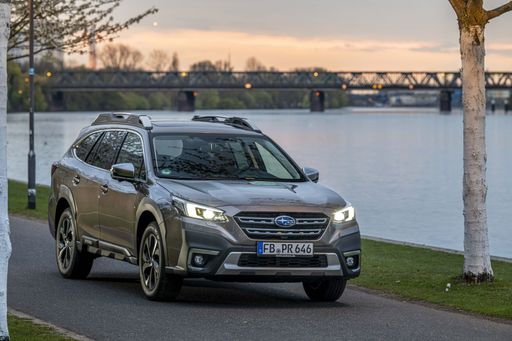 @ Subaru
@ Subaru

|

|
|
|
|
Costs and Consumption |
|
|---|---|
|
Price
24800 - 34800 £
|
Price
37200 - 41900 £
|
|
Consumption L/100km
5.4 - 6 L
|
Consumption L/100km
8.60 L
|
|
Consumption kWh/100km
13.1 - 13.7 kWh
|
Consumption kWh/100km
-
|
|
Electric Range
364 - 376 km
|
Electric Range
-
|
|
Battery Capacity
43 kWh
|
Battery Capacity
-
|
|
co2
0 - 136 g/km
|
co2
193 g/km
|
|
Fuel tank capacity
42 L
|
Fuel tank capacity
63 L
|
Dimensions and Body |
|
|---|---|
|
Body Type
SUV
|
Body Type
Estate
|
|
Seats
5
|
Seats
5
|
|
Doors
5
|
Doors
5
|
|
Curb weight
1316 - 1563 kg
|
Curb weight
1643 - 1676 kg
|
|
Trunk capacity
456 - 523 L
|
Trunk capacity
561 L
|
|
Length
4186 - 4226 mm
|
Length
4870 mm
|
|
Width
1805 mm
|
Width
1875 mm
|
|
Height
1550 - 1555 mm
|
Height
1670 - 1675 mm
|
|
Payload
367 - 469 kg
|
Payload
524 - 557 kg
|
Engine and Performance |
|
|---|---|
|
Engine Type
Petrol MHEV, Electric
|
Engine Type
Petrol
|
|
Transmission
Manuel, Automatic
|
Transmission
Automatic
|
|
Transmission Detail
Manual Gearbox, Dual-Clutch Automatic, Reduction Gearbox
|
Transmission Detail
CVT
|
|
Drive Type
Front-Wheel Drive
|
Drive Type
All-Wheel Drive
|
|
Power HP
125 - 168 HP
|
Power HP
169 HP
|
|
Acceleration 0-100km/h
7.4 - 9.8 s
|
Acceleration 0-100km/h
10.20 s
|
|
Max Speed
160 - 210 km/h
|
Max Speed
193 km/h
|
|
Torque
170 - 290 Nm
|
Torque
252 Nm
|
|
Number of Cylinders
3
|
Number of Cylinders
4
|
|
Power kW
92 - 124 kW
|
Power kW
124 kW
|
|
Engine capacity
999 cm3
|
Engine capacity
2498 cm3
|
General |
|
|---|---|
|
Model Year
2024 - 2025
|
Model Year
2021 - 2024
|
|
CO2 Efficiency Class
D, E, A
|
CO2 Efficiency Class
G
|
|
Brand
Ford
|
Brand
Subaru
|
Ford Puma
A Glimpse into the Ford Puma: Fusing Style with Innovation
The Ford Puma stands as a testament to modern engineering fused with style. This compact SUV is not just about aesthetics but brings to the table an array of technical innovations, topped with the reliability and performance Ford is known for. Let's delve into the technical specifics and innovative features that make the Ford Puma a stellar choice for any car enthusiast.
Powertrains and Performance
The Ford Puma is offered with a range of powertrains designed to deliver optimal performance whilst minimising fuel consumption. At the heart of this compact SUV is the 1.0 EcoBoost Hybrid engine, available in both 125 PS and 155 PS variants. This engine is a marvel of engineering, optimised to deliver power efficiently with a remarkable fuel consumption ranging from 5.4 to 5.7 L/100km for manual versions, and slightly higher for the automated variants.
The top-end 1.5 EcoBoost ST variant takes performance up a notch, providing a robust 200 PS that propels the Puma from 0 to 100 km/h in just 6.7 seconds. This variant is perfect for those who prioritise performance and exhilaration in their driving experience.
Mild-Hybrid Technology
The Puma's mild-hybrid technology plays a significant role in enhancing fuel efficiency and reducing emissions. By utilising a belt-driven integrated starter/generator, the Puma recovers energy usually lost during braking, storing it in a 48-volt lithium-ion battery. This stored energy is then used to assist the engine, providing a boost during acceleration and smoothing out the stop-start technology, ultimately leading to enhanced fuel efficiency.
Design and Comfort
The Ford Puma does not compromise on style and comfort with its ergonomic and stylish design. The SUV is available in multiple trims including the ST-Line, Titanium, and the luxurious Vignale editions, each offering unique aesthetic and technological enhancements. These trim levels provide varied offerings in terms of both exterior styling and interior comfort, ensuring there's a Puma that meets every personal preference.
Inside, the Puma offers a driver-focused cockpit with advanced technological integrations such as the SYNC 3 infotainment system, providing seamless connectivity and intuitive control of the vehicle's numerous technological features.
Safety and Technology
Safety remains paramount, and the Ford Puma is equipped with the latest security and technology features. It boasts the Ford Co-Pilot360 suite which includes adaptive cruise control, pre-collision assist with autonomous emergency braking, and lane-keeping assist, enabling a safer driving experience on both city roads and highways.
Versatility and Practicality
Beyond performance and safety, the Ford Puma shines in its versatility. With a boot capacity of 456 litres, it offers ample space for all sorts of adventures, whether you're heading on a family trip or loading sports equipment. Its innovative MegaBox is an extra storage solution, providing additional space below the boot floor.
The Puma's agile handling, paired with its compact dimensions—spanning a length of 4186 to 4266 mm and a width of 1805 mm—makes it an ideal choice for urban commuting and beyond.
Conclusion
In conclusion, the Ford Puma beautifully blends practical features with cutting-edge technology, offering a package that appeals to both the tech-savvy driver and those seeking comfort and reliability. Its range of innovative features, powerful yet efficient engine options, and a design that is both functional and stylish make it a frontrunner in the compact SUV market.
Whether you're drawn by the efficient mild-hybrid engines or the robust performance of the ST variant, the Ford Puma represents a modern driving experience where innovation meets everyday usability.
Subaru Outback
A Perfect Blend of Comfort and Capability: The Subaru Outback
For those who are looking for a car that skillfully combines rugged capability with luxurious comfort, the Subaru Outback has been a go-to choice. As a pioneer in the crossover SUV segment, this vehicle has continually impressed drivers with its unique blend of practicality and innovation. Let's dive into the details of what makes the Subaru Outback a standout choice in its class.
Dynamic Performance and Engine Details
Under the bonnet, the Subaru Outback is powered by a 2.5-litre Boxer engine, renowned for its balance and smooth operation. Delivering a robust 169 PS, the engine provides ample power for adventurous drives. With a torque of 252 Nm, it offers a responsive driving experience, especially when coupled with its CVT (Continuously Variable Transmission) gearbox.
All-Wheel Drive Mastery
A defining feature of the Subaru Outback is its full-time all-wheel-drive system, designed to enhance stability and grip, regardless of road conditions. Whether you're navigating twisting mountain roads or venturing off the beaten path, the Outback offers reassuring traction and control.
Efficiency and Environmental Considerations
Efficiency has not taken a back seat in the Subaru Outback. With a fuel consumption of 8.6 L/100 km, it strikes a good balance between performance and economy. However, it's worth noting that the vehicle's CO2 efficiency class is rated at G, reflecting its larger engine size and capability.
Spacious and Versatile Interior
The interior of the Subaru Outback is designed with passenger comfort and cargo versatility in mind. With seating for five, the spacious cabin is both practical and refined. Additionally, the boot space of 561 litres provides ample room for luggage and gear, making it an excellent choice for family outings and adventures.
Safety and Technology Innovations
The Subaru Outback is equipped with advanced safety technologies aimed at providing peace of mind on every journey. This includes Subaru's renowned EyeSight Driver Assist Technology, which features adaptive cruise control, pre-collision braking, and lane-keeping assist. These systems work together to help prevent accidents and enhance overall driving safety.
Conclusion
In summary, the Subaru Outback offers a comprehensive package of performance, comfort, and safety. Its ability to seamlessly transition from urban environments to rugged landscapes exemplifies its versatility. Whether you're seeking adventure or simply a reliable vehicle for daily use, the Subaru Outback has much to offer. With a price range of €43,440 to €48,840, it presents a compelling option for those who value quality and robustness in a crossover SUV.
The prices and data displayed are estimates based on German list prices and may vary by country. This information is not legally binding.
